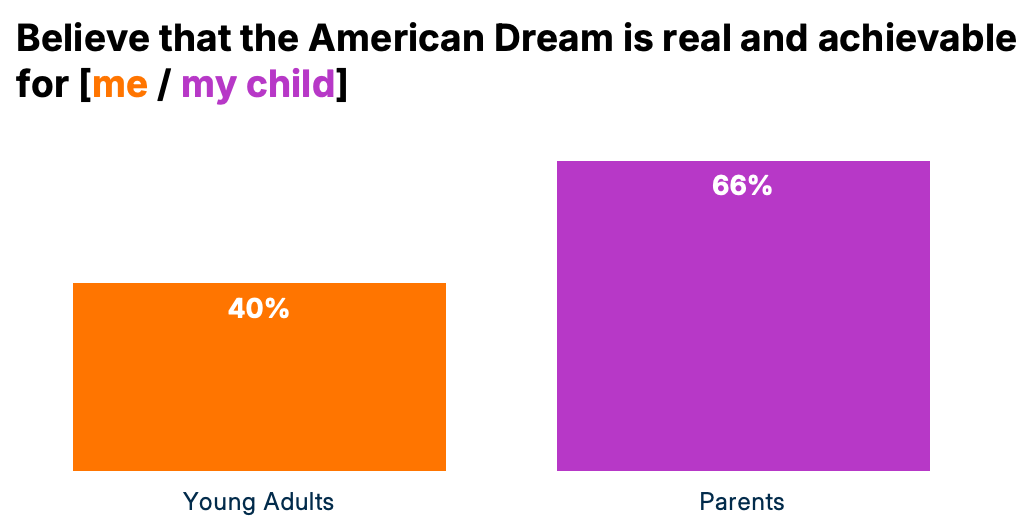Young People–Even Teenagers–Feel that the American Dream Is Unachievable for them the Way it Was for their Parents
The Gap Between What they Want and What they See as Possible is Where Political Anger–and Opportunity–Lies
According to a new report from the Schultz Family Foundation, only 40 percent of young Americans (ages 16-24, with a focus on low- and middle-income households) say they believe that the American Dream is real and achievable for them. And yet, 66 percent of their parents say they believe it is.
Equimundo found that 75 percent of men aged 18-45 (and 78 percent of women the same age) agreed that “It's much harder for my generation to feel financially secure than my father's generation.” Of the statements tested, it was the one they agreed with most. And more than half agree that “Home ownership is out of my reach.” [INSERT GRAPHIC]
While this data is similar for young men and young women, young men are overlaying these economic realities with traditional expectations–and desires–to provide for families. And the inability to do that explains much of the frustration with a system that isn’t working.
Over and over in SAM’s focus groups, young men expressed frustration and disappointment that the American Dream was so out of reach to them. And Trump was able to speak to that. Explaining why Trump appealed to young men, one white Appalachian man said,
"I think that he also was somebody who was selling the American dream that doesn't exist anymore, and he is part of the reason why it doesn't exist anymore, but it benefits him and people like him to have us believe that it still exists."
Young Americans Deeply Desire those Opportunities, But Don’t Think They’ll be Able to Achieve Them
The Spring 2025 Harvard Institute of Politics survey (run by SAM cofounder John Della Volpe) found that financial security and owning a home are overwhelmingly important to young Americans, but there is a major gap between that desire and what they think they expect to achieve.
Young People are Specifically Concerned About their Inability to Buy a Home, and The Data Shows They’re Not Wrong
The AP found that 70 percent of American teens aged 13-17 believe buying a home will be more difficult for them than for their parents–again, it was the #1 response of the questions asked.
Indeed, the median age of homebuyers has increased by 25 years over the last 45–an entire generation older. And the ratio of the cost of a median home to the median income has skyrocketed to 7.3, while it was closer to 4 for their parents 25 years ago, and even lower for their grandparents 50 years ago.
In one SAM focus group, a young Black professional man said,
"I can't buy a house right now. I mean, I could, but it would take a lot, a lot more than what it did for my grandfather. My grandfather was working for the trash company for the city and got a house for his five kids and was good."
An Asian American young man working in the tech industry said,
"I think one of the things, for our generation, is we might not be able to ever buy and own a house, you know, on top of just trying to afford to live. So that's something that I've been struggling with and trying to figure out what to do long-term. Because I'm just renting in the Bay Area, and my rent has, like, doubled since the pandemic."
And a young Hispanic man said,
"I think it's just so out of reach. The fact that they say, ‘I wanted to get a house’, that's just, like, not even fathomable to me."
This gap between what young people want and the realities of what they’re able to achieve creates anger, but it also creates a clear roadmap to reach this audience. Young people are telling political leaders what they want. Leaders can either offer good faith solutions that create real opportunity and change, or allow others to weaponize that anger and frustration.





